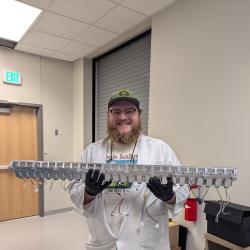Physics’ Jay Deep Sau Receives National Science Foundation CAREER Award
Jay Deep Sau, an assistant professor of physics at the University of Maryland and fellow of the Joint Quantum Institute, received a Faculty Early Career Development (CAREER) Award from the National Science Foundation (NSF) for his proposal titled “Topologically Protected Quantum Devices.” Sau, a theoretical condensed matter physicist interested in applying topological principles to create protected solid-state and cold-atomic systems for quantum information processing, will use the $443,908 award to build a research program focused on predicting phenomena that could help pave the way for topological quantum computation.
“Receiving an NSF CAREER award is a great honor because it represents validation from the condensed matter physics community of my work in research and education,” said Sau. “I am excited to use the award to predict truly macroscopic quantum systems and phenomena, in collaboration with experimental colleagues at Maryland who elucidate the beautiful physics of topological field theory.”
While quantum mechanics naturally operates at excruciatingly tiny length scales—such as those found in a single atom—physicists are also interested in examining much larger quantum systems where the individual quantum pieces can interact through many pathways. In this case, stabilizing the associated quantum phenomena can be exceedingly difficult due to the detrimental influence of the unavoidable interaction of the large system with its surroundings. One possible approach to creating and studying such macroscopic quantum phenomena is based on recently discovered topological phases in condensed matter systems, which for fundamental reasons are effectively protected from the environment.
The funded research aims to investigate the rich variety of static and dynamical phenomena that arise from the interplay of novel topological phases with conventional physics, such as electrostatic interactions, crystal lattice vibrations and material impurities. Recent experiments indicate that the physics of topological systems cannot be understood without considering these conventional ingredients. In addition, exploring the physics resulting from this interplay will likely lead to the discovery of new phenomena, which could influence the design of quantum computers.
As part of the award, Sau will teach an extended online course that will be available internationally and host an open-access forum for graduate and undergraduate students on topological phases. He will also participate in outreach activities in the local community and contribute to a seminar series that aims to retain underrepresented minority physics students at UMD who transfer from community college.
Sau has authored more than 75 peer-reviewed journal publications. Before joining the UMD faculty in 2013, Sau worked as a postdoctoral researcher in physics at Harvard University and UMD. He earned his bachelor’s degree in electrical engineering from the Indian Institute of Technology in Kanpur, India, and his doctoral degree in physics from the University of California, Berkeley.
The CAREER award is the NSF's most prestigious award in support of junior faculty members who exemplify the role of teacher-scholars through outstanding research, excellent education, and the integration of education and research within the context of the mission of their organizations. The award provides five years of financial support.
Media Relations Contact: Abby Robinson, 301-405-5845, abbyr@umd.edu
University of Maryland
College of Computer, Mathematical, and Natural Sciences
2300 Symons Hall
College Park, MD 20742
www.cmns.umd.edu
@UMDscience
About the College of Computer, Mathematical, and Natural Sciences
The College of Computer, Mathematical, and Natural Sciences at the University of Maryland educates more than 7,000 future scientific leaders in its undergraduate and graduate programs each year. The college's 10 departments and more than a dozen interdisciplinary research centers foster scientific discovery with annual sponsored research funding exceeding $150 million.







